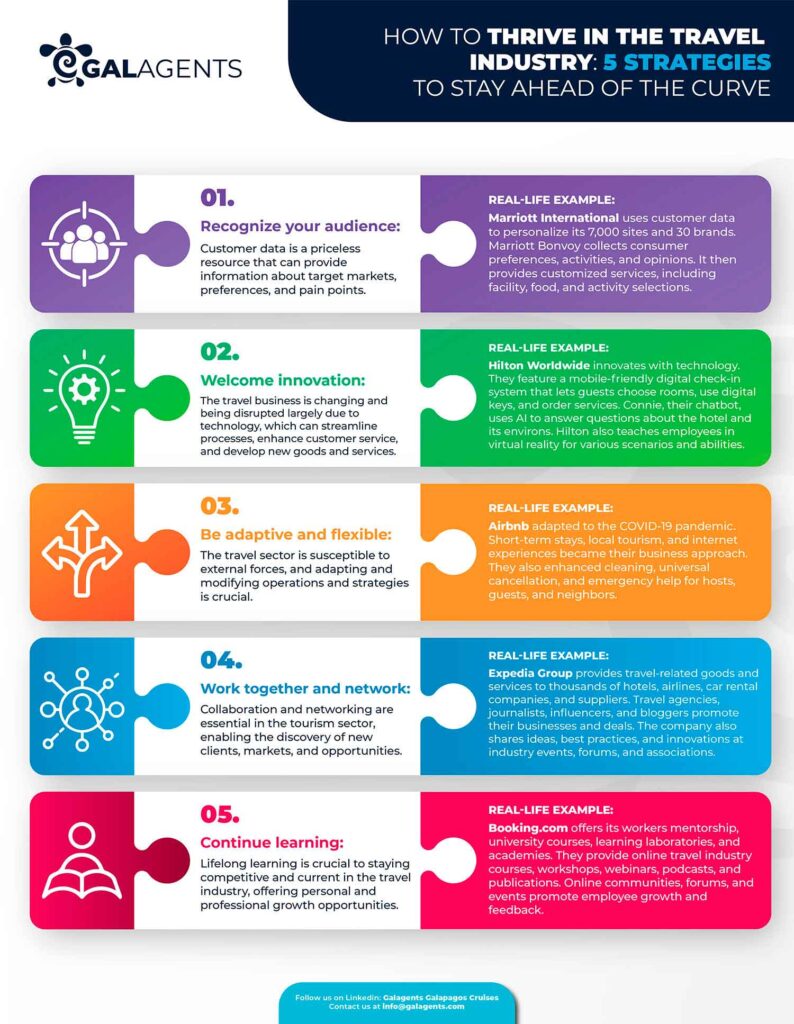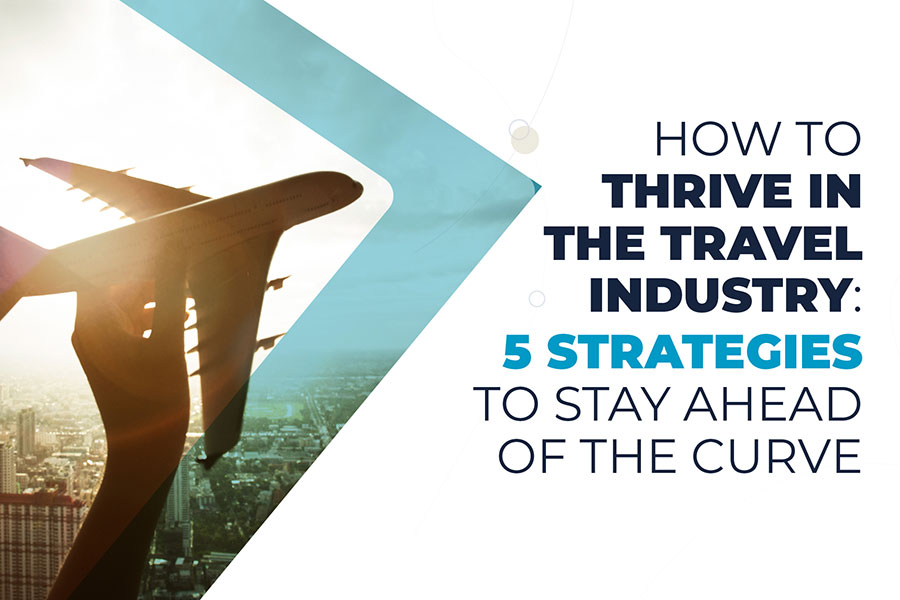The travel sector is one of the world’s most competitive and dynamic industries. It continuously adjusts to evolving trends, technology, client preferences, and difficulties. As a travel industry expert, you must keep informed of these developments and devise strategies to set yourself out from the crowd. Here are some pointers on how to keep up with the rapidly evolving tourism business.
1.- Recognize your audience
Understanding your clients and their demands is the first step in keeping ahead of the curve. You must understand who they are, what they desire, how they act, and what factors shape their decisions. Customer data may be gathered and analyzed using various tools and techniques, including surveys, feedback forms, social media, online reviews, loyalty programs, and CRM systems. Understanding your target market can help you develop goods, services, and marketing plans to satisfy them and build a devoted following.
Insight: Customer data is a priceless resource that may give you information about your target markets, clientele, preferences, and pain concerns. Personalized offers, suggestions, and experiences may be developed using this data to raise client retention, happiness, and loyalty.
Real-life Example: Marriott International utilizes consumer information to tailor the experiences of its visitors at its 7,000 locations and 30 brands. The business uses its loyalty program, Marriott Bonvoy, to gather information on customer preferences, actions, and comments. It then applies this information to provide specialized services, such as choices for facilities, food, and activities. In addition, Marriott’s creation of tailored marketing campaigns and promotions that can increase reservations and revenue also uses data.
2.- Welcome innovation
Adopting new technology to improve your company’s operations and customer experience is the second step in keeping ahead of the curve. You must be open-minded and eager to try out novel concepts and remedies to get a competitive edge. For instance, you may employ biometrics, blockchain, virtual reality, augmented reality, chatbots, artificial intelligence, and other cutting-edge technologies to streamline procedures, customize offerings, build immersive experiences, and boost security and trust. Adopting innovation may increase your productivity, quality, and profitability.
Insight: The travel business is changing and being disrupted in large part due to technology. You may use it to streamline business processes, cut expenses, boost output, and enhance customer service. Additionally, it may assist you in developing fresh goods, services, and company plans that can satisfy your clients’ varying demands and expectations.
Real-life Example: Hilton Worldwide leverages technology to provide novel solutions for both its personnel and visitors. The business has created a digital check-in system that lets visitors pick their rooms, enter them with a digital key, and make service requests using their cell phones. Connie, the company’s chatbot that can answer inquiries and offer details on the hotel and its surroundings is likewise powered by artificial intelligence. Additionally, Hilton trains its staff in virtual reality for various scenarios and abilities.
3.- Be adaptive and flexible.
Adapting to shifting market conditions and client expectations is the third stage in keeping ahead of the curve. You must possess the ability to act swiftly and decisively in the face of any potential challenges or new possibilities in the tourism sector. This may be achieved by monitoring consumer input, market trends, competition activity, and industry rules. To plan for many scenarios and outcomes, you may also employ risk management strategies, contingency planning, and scenario planning. You can take advantage of new chances and overcome obstacles by being adaptive and flexible.
Insight: The travel sector is susceptible to outside forces that are out of your control, such as calamities, pandemics, disturbances in the political system, and financial crises. These elements may significantly affect how well your firm does and how customers behave. Therefore, these risks must be anticipated, and you must be able to modify your operations and strategy as necessary.
Real-life Example: An organization that has demonstrated adaptability and flexibility in the face of the COVID-19 outbreak is Airbnb. The company immediately changed its business strategy to concentrate on short-term stays, local tourism, and online experiences. Additionally, the business introduced fresh programs to help its hosts, visitors, and neighborhoods, like improved cleaning procedures, universal cancellation rules, and emergency money.

4.- Work together and network
Working together and networking with other travel industry experts and stakeholders is the fourth step to remain ahead of the curve. Relationships with your consumers, partners, distributors, influencers, and suppliers must be solid. You may interact, share information, exchange ideas, and offer help through various platforms and methods. You may also participate in online forums and groups, join industry associations, attend trade fairs, seminars, and events, and follow industry leaders and professionals. You may get knowledge from others, widen your network, and forge synergies through working together and networking.
Insight: Successful collaboration and networking are crucial in the tourism sector. They can assist you in finding new clients, markets, and possibilities. They can also help you maximize other people’s knowledge, resources, and talents. They may also assist you in establishing credibility, reputation, and trust within the sector.
Real-life Example: Expedia Group is an example of a business that networks and interacts with many travel industry players. The firm collaborates with thousands of hotels, airlines, car rental agencies, and suppliers of attractions and activities to provide its consumers with a vast array of travel-related goods and services. In addition, the firm collaborates with travel agents, media organizations, influencers, and bloggers to market its brands and offers. The organization regularly participates in industry events, forums, and associations to share its ideas, best practices, and innovations.
5.- Continue learning.
Maintaining your knowledge and abilities via ongoing learning is the fifth step to keeping ahead of the curve. To advance as a travel industry professional, you must have a curiosity for learning new things and an eagerness to do so. Many tools and chances for learning are available, including books, podcasts, blogs, webinars, courses, certificates, and mentorships. To determine your strengths and places for growth, you may also ask your clients, coworkers, bosses, and mentors for comments. Finally, you may improve your expertise and confidence by continuing to study.
Insight: Learning is a lifelong activity that can keep you competitive and current in the travel business. You may increase your performance and productivity by learning new skills, information, and viewpoints. Additionally, it may assist you in finding new chances, fashions, and technological advancements that can support your clients and your company.
Real-life Example: An illustration of a business that encourages learning among its staff is Booking.com. The organization provides various learning opportunities for its employees, including the Booking.com Mentorship Program, Booking.com University, Booking.com Learning Lab, and Booking.com Academy. In addition, access to online courses, workshops, webinars, podcasts, articles, and other learning materials on a range of subjects about the travel industry is made possible via these programs and platforms. The organization also promotes employee development and feedback sharing through online communities, forums, and events.
To conclude, the travel business is a dynamic, fascinating field with numerous prospects for development and success. However, ongoing invention, adaptability, and learning are also necessary to stay ahead of the curve. You may improve your effectiveness and competitiveness as a travel industry professional by using the advice in this article.

